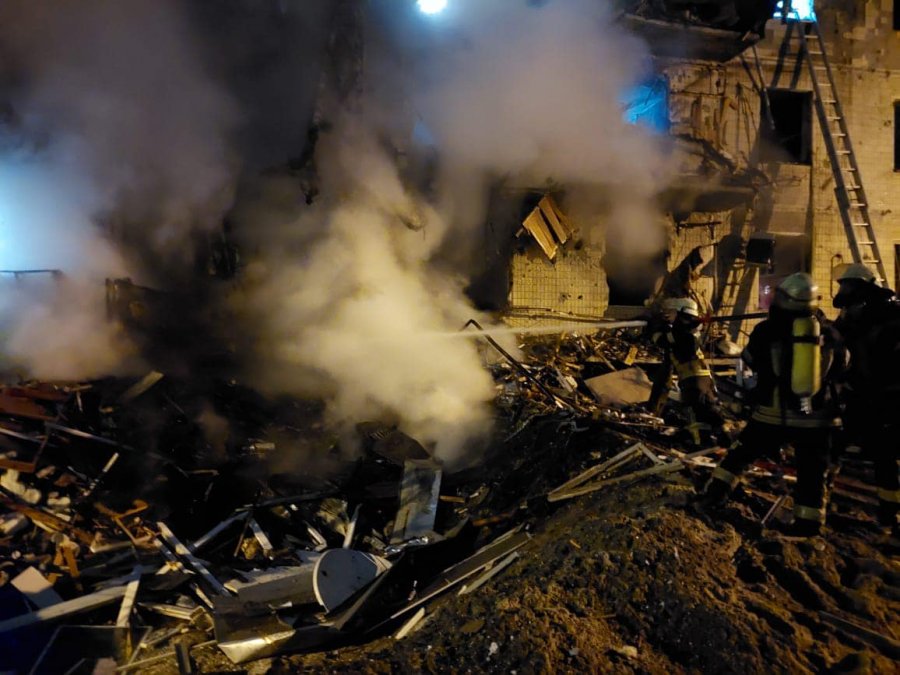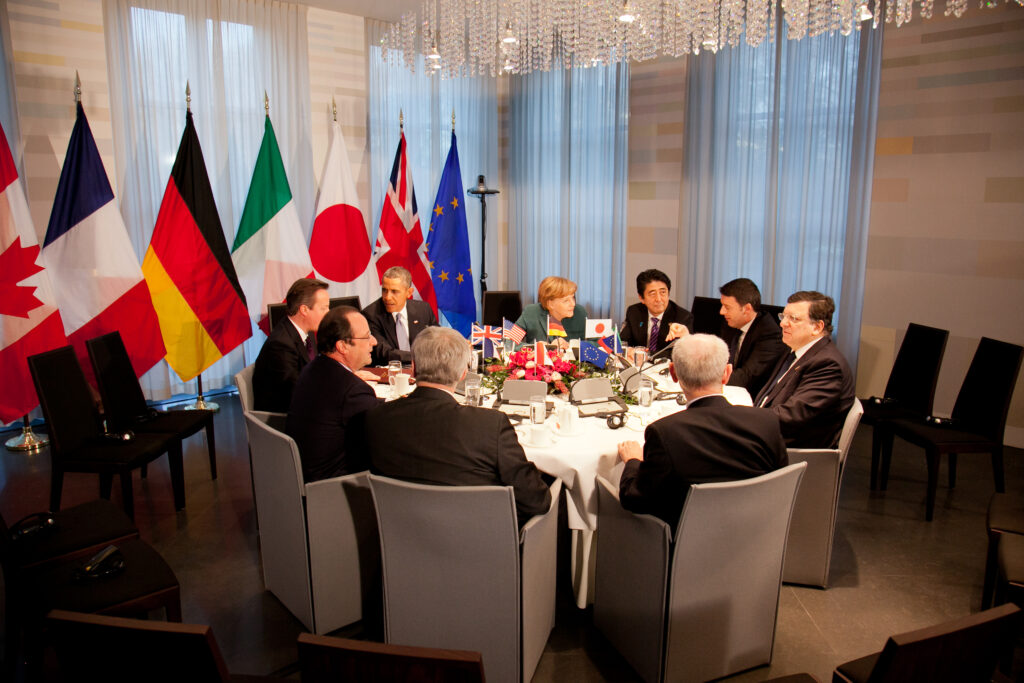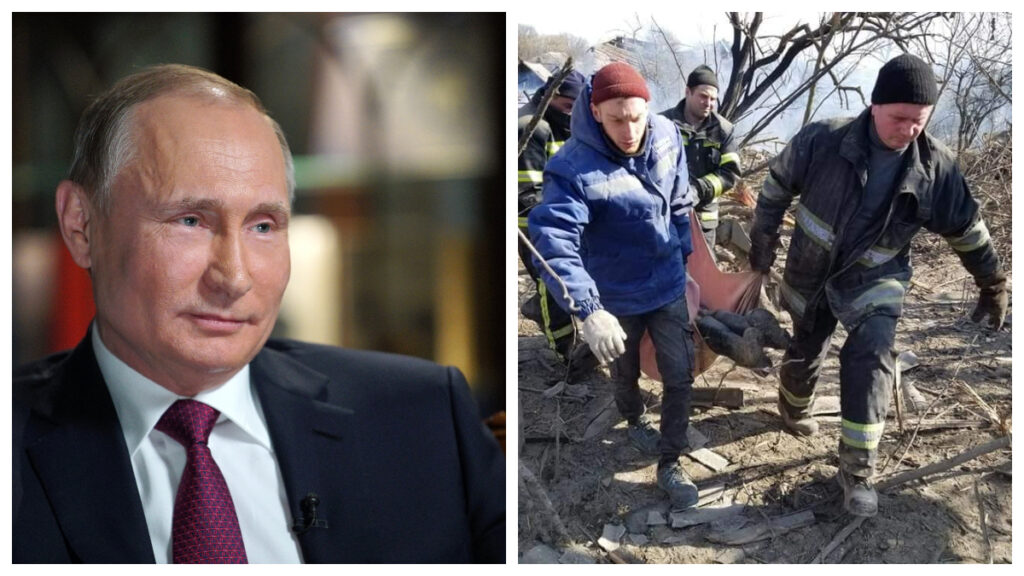The Ukrainian parliament’s committee on anti-corruption policy is calling on the G7’s Financial Action Task Force on Money Laundering to expel Russia and add it to the blacklist of high-risk jurisdictions, making international transactions with Russia impossible and crippling the country’s war engine, Anastasia Radina, the committee’s head, writes.
A humanitarian catastrophe is unfolding in Ukraine, and the rest of the world is an eyewitness. Vladimir Putin is waging an indiscriminate war on Ukraine’s civilian population. Russian forces’ devastating siege of Mariupol, including the deliberate bombing of a children’s and maternity hospital, is part of a pattern. As the Ukrainian president, Volodymyr Zelensky, says, it is further evidence that genocide is taking place in our country.
Ukraine has become the West’s battered shield against Putin
More than 2,100 people have been killed in Mariupol alone since the invasion began. Across Ukraine, Russian troops are holding hundreds of thousands of people hostage, preventing them from leaving their towns and cities while shelling them indiscriminately and without warning.
An estimated 2.8 million people have fled the country, and millions more have had to leave their homes to seek refuge. People have queued at the border for days, and many have found safety in the homes of neighbours and strangers. A thousand communities have no heat, electricity, or water. There are reports of people drinking from puddles, and of children dying from dehydration.
Throughout Putin’s 22-year rule, Russia has repeatedly acted with impunity, blackmailing the world with the tacit threat of nuclear retaliation.
The international community has watched his regime ravage Chechnya and Georgia with the same kind of scorched-earth campaign that it is pursuing in Ukraine, illegally annex Crimea, and wage hybrid war against other countries around the world. The Kremlin-backed regime in Syria has pushed 90% of that country’s people into poverty, and the United Nations reports that 14.6 million Syrians, out of a population of 17.5 million, require humanitarian assistance. Now, Ukraine has become the West’s battered shield against Putin.

With the international security system in tatters, and humanitarian laws being violated again and again, what Ukraine needs most urgently are weapons and missile systems to protect the sky. But, in addition to military, economic, and humanitarian assistance, Ukraine desperately needs the world to isolate Putin further through legal action.
Make international transactions with Russia impossible
That is why the Ukrainian Parliament’s Committee on Anti-Corruption Policy is calling on the Financial Action Task Force on Money Laundering to expel the Russian Federation and add it to the blacklist of high-risk jurisdictions.
As the international body charged with combating terrorist financing and money laundering, the FATF could make international transactions with Russia impossible, thus crippling the country’s war engine. Yet even in the face of crimes like those committed in Mariupol, the FATF has failed to act.
The FATF was created by the G7 (an inter-governmental political forum consisting of Canada, France, Germany, Italy, Japan, the UK, and the US – editor) in 1989 to coordinate legal and regulatory action against threats to the world financial system from money laundering and terrorist financing.

The organisation has 39 members, including the Russian Federation, and more than 200 member jurisdictions. Among its members’ core responsibilities (outlined in its 40+9 Recommendations) are to criminalise “the financing of terrorism and associated money laundering” and to freeze and confiscate “terrorist assets.”
Among other tasks, the FATF identifies jurisdictions that pose a threat to the international financial system through weak enforcement of rules against money laundering and terrorist financing, and places them on a list of high-risk jurisdictions. Russia was blacklisted in 2000 for its repeated failure to comply with international measures against money laundering, and was removed from the list in 2002 for progress in compliance. Obviously, given the amount of information about money laundering and terrorism financing conducted by the Russian government, whatever progress occurred has been reversed.
Russia’s actions in Ukraine constitute terrorism
And make no mistake: Russia’s actions in Ukraine constitute terrorism. The so-called Donetsk People’s Republic and Luhansk People’s Republic have been engaging in terrorism while operating under direct Russian control for eight years.
In July 2014, a Russian Buk missile downed Malaysia Airlines Flight 17 over eastern Ukraine, killing 298 passengers and crew. The Dutch Public Prosecution Service has charged three Russians (Igor Girkin, Sergey Dubinsky, and Oleg Pulatov) and one Ukrainian (Leonid Kharchenko) with murder.
Since the start of Russia’s full-scale invasion of Ukraine on February 24, there have been countless attacks on civilians. These include rocket strikes on residential buildings, hospitals, kindergartens, and asylums in Kyiv, Kharkiv, Sumy, Chernihiv, and other population centers.
Russian forces have even attacked facilities at the Chernobyl and Zaporizhzhya nuclear power plants and the Kyiv reservoir, showing extraordinary recklessness. All these acts fall under the definition of terrorism. They are designed to further Russia’s political aims by killing, maiming, and intimidating the civilian population.
Russia has thus violated both the UN International Convention for the Suppression of the Financing of Terrorism (1999) and the International Convention for the Suppression of Acts of Nuclear Terrorism (2005). UN Security Council Resolution 1373 (2001) requires all states to prevent the financing of terrorist acts, yet Russia has been doing precisely that in Luhansk and Donetsk.
Inaction amounts to support for Putin
In these circumstances, Russia’s continued membership in the FATF is a further affront to international law. The organisation’s president, Marcus Pleyer, and G7 governments should move to expel Russia and add it to the list of High-Risk Jurisdictions, defined as those “with serious strategic deficiencies to counter money laundering, terrorist financing, and financing of proliferation.”
To date, FATF has expressed “grave concern” about the situation in Ukraine and indicated that it is “reviewing Russia’s role” within the organisation. However, it won’t meet again until June, and it appears to be sticking to that schedule. Such inaction amounts to support for Putin. International agreements are worthless unless they are applied and enforced in a timely manner.
One of the great unlearned lessons of history is that appeasement does not work. My grandfather is 93, and he refuses to leave Kyiv. He was a boy when the Nazis took his city in 1941. What is the point of saying “never again” for 80 years if you are not prepared to act when the moment of truth arrives? The least the West could do is hold Putin to account for deliberately attacking civilian targets. A decisive move by the FATF would be a good start.
The world is watching. Russian Foreign Minister Sergei Lavrov called criticism of the Mariupol hospital bombing “pathetic.” In a way, he is right. Responding to such crimes with words is pathetic. The West must do more to ensure that “never again” still means something.
Copyright: Project Syndicate, 2022. The opinions in this article are those of the author.

